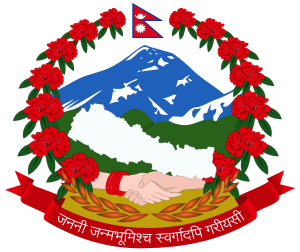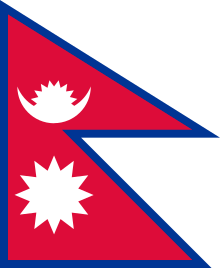Ministry of Federal Affairs and General Administration (Nepal)
| सङ्घीय मामिला तथा सामान्य प्रशासन मन्त्रालय | |
 Emblem of Nepal | |
| Ministry of Nepal overview | |
|---|---|
| Preceding agencies |
|
| Headquarters |
Kathmandu 27°41′40″N 85°19′32″E / 27.694344°N 85.325521°ECoordinates: 27°41′40″N 85°19′32″E / 27.694344°N 85.325521°E |
| Minister responsible | |
| Website |
mofald |
Ministry of Federal Affairs and General Administration (Nepali: सङ्घीय मामिला तथा सामान्य प्रशासन मन्त्रालय), popularly MoFAGA, is the ministry of Nepal accredited with the role of coordination, cooperation, facilitation and monitoring and evaluation of activities undertaken by local governments; regulation and management of the civil service in the country.[1] MoFAGA is the only ministry with direct linkage with the country's local governments, namely municipalities, rural municipalities and provinces. It also plays direct role in implementing various eServices in the local governments.[2]
Background
- In 1972, Local Development Department (Nepali: स्थानीय विकास विभाग) under then Home affairs and Panchayat Ministry (Nepali: गृह एवं पञ्चायत मन्त्रालय) was established.
- In 1982, Local Development Department separately established as Local Development Ministry (Nepali: स्थानीय विकास मन्त्रालय).
- In 2008, Nepal abolished monarchy and owned Federalism thus "Federal Affairs" added to "Local Development Ministry".
Divisional Branches
Ministry has 7 divisions, namely
- Federal Affairs Division
- General Administration Division
- Self Governance Division
- Monitoring and Evaluation Division
- Planning and Foreign Aid Co-ordination Division
- Municipality and Environment Management Division and
- Infrastructure Development Division.[3]
Objectives[4]
- Contribute in the poverty reduction by mobilizing local means and resources, utilizing skill and technology to the optimum level and creating employment opportunity.
- Enhance access of socially and economically disadvantaged groups, region and community to the service and facility delivered.
- Capacity building of local government through local self governance and contribute to promote local good governance.
- Empowerment of women, dalit, indigenous, Madheshi, Muslim, disable and ultra-poor people through social mobilization and their mainstreaming into the wave of development.
- Ensure inclusive development by enhancing peoples' participation in decision making and planning process.
References
- ↑ "Archived copy". Archived from the original on 2013-12-03. Retrieved 2013-11-23.
- ↑ "Tracking eGovernment Services in Nepal | EkendraOnLine.com". Retrieved 2016-09-11.
- ↑ "Ministry of Federal Affairs and Local Development | Nepal Government". mofald.gov.np. Retrieved 2016-09-11.
- ↑ "Archived copy". Archived from the original on 2013-12-03. Retrieved 2013-11-23.
This article is issued from
Wikipedia.
The text is licensed under Creative Commons - Attribution - Sharealike.
Additional terms may apply for the media files.
